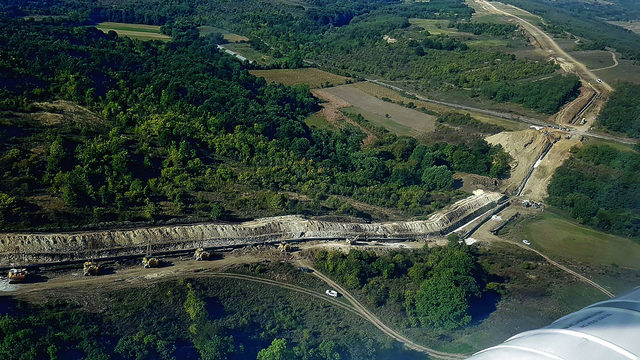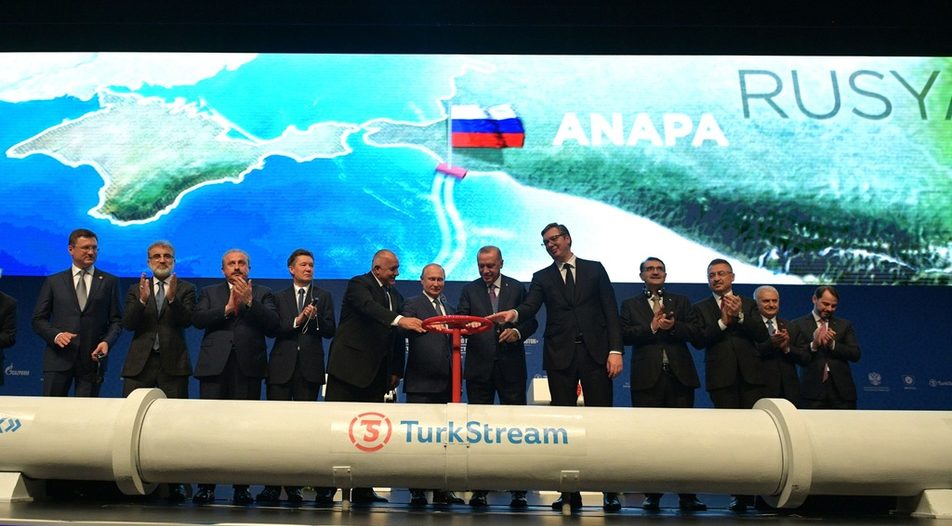TurkStream is the largest single investment by the Bulgarian state in recent years. Dubbed Balkan Stream by Bulgarian authorities, the pipeline only happened because of the unprecedented support, which in many aspects is illegal. The extension of Gazprom's TurkStream natural gas pipeline through Bulgaria toward central Europe has cost the Balkan state nearly BGN 3 billion (EUR 1.5 billion). The extension of more than 470km in length was built in a year, while the 150km-long gas connection to Greece, which enjoys full EU support and funding, has been under construction for three years and is nowhere to be seen.
Contrary to expectations, the westward extension to the pipeline that brings gas from Russia to Turkey under the Black Sea is unlikely to deliver any additional benefits to Bulgarian taxpayers. There will be no diversification of gas supplies for Bulgaria which already imports gas from Russia via another pipeline, no decrease of import prices, and because of the delayed construction works the Russian company could even seek penalties from the state-owned gas transmission system operator Bulgartransgaz.
All of it is shrouded in controversy: from project planning, the booking of capacity by Gazprom for 20 years, the scandalous procedure of contractor selection, the violated environmental regulations, the secret replacement of a Saudi contractor for construction works by a Russian one and the import of workers, to the severely reduced revenues for Bulgaria.
Haste, however, has a hidden price. It is in the ecological toll - the damaged bed of the Vit river and the polluted drinking water of Pleven, a city in northern Bulgaria. It is also in the loss of human life - at least 7 people died during the construction. These facts are not discussed publicly, but people who have worked in the construction of TurkStream in Bulgaria talked to Capital about some of the documented cases. The problem lies not only in the tragic accidents themselves, but also in the lack of information on whether anyone was held accountable at all.
Grim statistics
Accidents and loss of life happen during construction works. The bigger the project, the greater the likelihood of accidents. But it is certainly a precedent not to investigate cases and to keep the media uninformed. Even more so when it comes to foreign workers.
Data from the Employment Agency provided to Capital at the end of last year shows that for the period from January 1st to September 30th 2020, there were 1727 foreign workers in Bulgaria after an intra-corporate transfer in connection with large infrastructure (gas) projects. Most of them were Russian - 1348, and a further 246 arrived from Belarus.
The first recorded fatal accident at the gas pipeline construction site is from March 28 of last year. Back then Bulgartransgaz publicly announced that a 62-year-old Italian citizen had died as a result of an accident at work on the construction of the Balkan Stream. There is no information on whether the foreign worker had any proper documents, whether he had insurance, what the exact cause of the accident was and whether the contractor had taken adequate measures to provide a safe working environment - things the state usually investigates in similar cases.
On April 18, less than a month later, another Italian worker aged 41 died at the site. Apparently, he received a head injury from a blow by a crane used to load steel pipes on trucks. Bulgartransgaz expressed its condolences to the families of the deceased workers, but since then official statements on similar accidents have ceased.
On June 17, a Belarusian man hired to work on the gas pipeline died. The circumstances were more than strange: the man was placed under a 14-day coronavirus quarantine, staying in a room on the second floor of a hotel in the town of Lom. According to media reports, he and two other colleagues went out on the balcony and as the three of them leaned on the railing, it suddenly broke off and they fell from the second floor. The 48-year-old man died on the spot. Police launched pre-trial proceedings, but there has been no definitive outcome to this investigation.
The tragic incidents surrounding the construction of TurkStream's extension in Bulgaria continued on September 12, when the driver of a truck carrying equipment for the gas pipeline fell asleep behind the wheel and crashed into a car and a house on the main street of Draganovo village. As a result, the 44-year-old man who was in the hit car died. There was no official statement from Bulgartransgaz.
Two more people involved in the construction of TurkStream's extension, a driver and a Ukrainian worker died on October 23 after an accident in Montana Region, and four other workers from Russia and Belarus were injured. No public statement followed the accident. A week later, Bulgarian civil organisation BOEC publicly asked why Prosecutor General Ivan Geshev and the prosecution were not investigating the accident. According to BOEC, another person was also killed, but this has not been publicly confirmed. Sources claim that the responsible institutions are concealing the facts to avoid drawing attention to the project.
On December 18th 2020, another accident occurred - a car and a truck crashed on a road leading to the city of Ruse. One of the men in the car died. Public information is more than scarce, but people working on the construction of TurkStream's extension told Capital that that the accident was once again related to the gas pipeline project. They also said there were many more accidents which were also not investigated by the labour inspectorate.
Capital sent questions on the subject to the General Labour Inspectorate. While they couldn't disclose any specific information, they said that they carried out 35 inspections for compliance with labour legislation at the site in 2020. Two of the inspections were carried out to investigate fatal accidents. The most common violations were related to non-compliance with the established health and safety requirements at the site, the procedure for employment of third-country nationals, as well as unequal treatment of Bulgarian workers.
Environmental concerns or lack thereof

The hastened construction has led to several environmental incidents. The most infamous of them is the pollution of drinking water in Pleven, the news of which hit the TV screens. During the construction works in the area at the end of September several water supply sites were damaged when large quantities of bentonite (a clay-like substance used in the laying of underground pipes) were dumped there.
According to information of Capital, at least 30 tons of bentonite were "dropped" in the water wells. The construction of the pipeline was then halted and water samples were taken. Initially, the pollution was confirmed, but soon after the case was abandoned. To date it is unclear whether the project has been amended as promised, or is being implemented as originally planned.
The 'army of help'
The army seems to have also been involved in aiding the process of construction. The website bird.bg (Bureau for Investigative Reporting and Data) revealed that at the end of August last year Bulgarian troops were deployed to ensure the passage of heavy equipment for the construction of TurkStream across the Yantra river. The reason was that the mayor of Petko Karavelovo village refused to allow the use of an existing bridge, which he reasoned would be damaged by the heavy equipment.
The military then built a modular bridge that even tanks could use to cross the river. The Ministry of Defense announced after an enquiry from bird.bg that the service was provided under a civil contract that has been paid for, but the price and the contractor weren't specified.
All these details are only a fraction of the consequences of the hasty construction of a megaproject that cost nearly BGN 3 billion of state money. They make clear that without the strong support of the state the TurkStream pipeline extension would have been difficult to build. All this would have been justified had the interest of Bulgarian taxpayers been protected. But in this case over the next 20 years the project will only benefit Gazprom in transporting natural gas to Serbia and Hungary.
TurkStream is the largest single investment by the Bulgarian state in recent years. Dubbed Balkan Stream by Bulgarian authorities, the pipeline only happened because of the unprecedented support, which in many aspects is illegal. The extension of Gazprom's TurkStream natural gas pipeline through Bulgaria toward central Europe has cost the Balkan state nearly BGN 3 billion (EUR 1.5 billion). The extension of more than 470km in length was built in a year, while the 150km-long gas connection to Greece, which enjoys full EU support and funding, has been under construction for three years and is nowhere to be seen.
Contrary to expectations, the westward extension to the pipeline that brings gas from Russia to Turkey under the Black Sea is unlikely to deliver any additional benefits to Bulgarian taxpayers. There will be no diversification of gas supplies for Bulgaria which already imports gas from Russia via another pipeline, no decrease of import prices, and because of the delayed construction works the Russian company could even seek penalties from the state-owned gas transmission system operator Bulgartransgaz.












